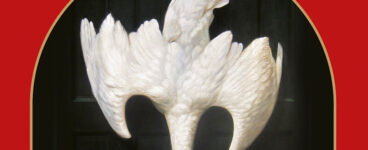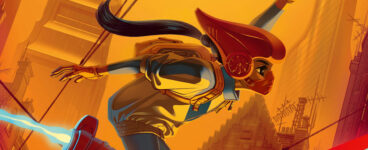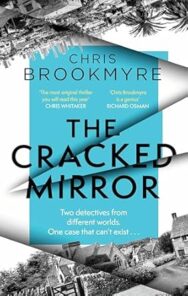‘Once you start adding flesh and bones to these characters, they suggest things you never thought of, and the story goes off in unexpected directions. Which is as it should be, because if you don’t surprise yourself, you can’t surprise the reader.’
Christopher Brookmyre’s The Cracked Mirror looks set to be the most imaginative and entertaining crime novel of the year. He spoke to us about characterisation through memories and breaking boundaries in the crime genre.
The Cracked Mirror
By Christopher Brookmyre
Published by Abacus
Hello Chris! We at BooksfromScotland are totally intrigued by your upcoming novel, The Cracked Mirror, can you tell our readers what to expect?
in a nutshell, it’s a novel about a Miss Marple type character who finds herself having to team up with a hard boiled LAPD homicide detective who has shades of Harry Bosch; or perhaps it would be more accurate to say he would belong comfortably in a Shane Black movie. Her name is Penny Coyne, a retired librarian who lives in a sleepy Perthshire village, where despite its upmarket demographic, there tends to be a lot of murders, all of which she has solved. Meanwhile in Los Angeles, there is Johnny Hawk, who is your classic maverick detective, the kind who is always in trouble with his captain and always losing partners like Spinal Tap lose drummers. Johnny is investigating what appears to be a suicide, but he has got a hunch that there’s more to it, and his investigation leads him to a wedding in Perthshire where his path crosses with that of Penny.
You have run the gamut in terms of how you’ve approached your crime writing throughout your career: procedural novels, historical novels, psychological novels, and now this genre buster, how do you see yourself as a writer? How do you view the possibilities in crime fiction?
I think I have always been trying to explore the boundaries of the genre even before I really understood where they lay. I always start with a story idea and I get excited by the possibilities of where that story might take me as a writer, as well as where it might take the reader. I love having the chance to explore new territory, for instance writing a crime novel set in space with Places in the Darkness, which let me put a cross-genre twist on a buddy-cop thriller. Working with Marisa Haetzman to write the Ambrose Parry novels was the most exciting departure, though. It would have been a daunting landscape to navigate on my own, but I had a very sure-footed guide with me.
Who are your favourite crime writers just now?
I am always really excited when there’s a new Mick Herron novel. I relish the skewed perspective he brings to the espionage novel, but also the understated affection with which he draws his characters. Denise Mina remains one of the most exciting writers operating in any genre, as you’re never sure where she’s going to take you next. I particularly love how she has embraced a more playful aspect to her writing in recent years, something that was particularly evident in Three Fires, which was just laugh-out-loud funny in places.
The Cracked Mirror is novel about crime fiction too; you play with the conventions; you draw attention to the book trade and the film trade; there are references to other novels, including The Cracked Mirror throughout. Why did you want to do this?
When I set out to write it, I realised it was going to be a novel about story: about what stories mean to us and about the way we lose ourselves in stories. The latter part of the book takes place at a videogames industry convention, but the theme of the event is storytelling within video games, as I wanted to look at how we use different mediums convey narrative. Obviously there is a meta quality to the novel, but I’m extremely wary of overstressing that, because often when you say meta, it often connotes something a bit clever-clever and emotionally distant. This is a novel that’s very much about its characters’ emotions. I said to my editor when I was pitching it, that if I don’t make you cry with this, I’ve failed.
Memory and the tricks or glitches of memory influence your characters too. Do you see our creation of ourselves with our memories in a similar way to how an author creates a story? Are you interested in the philosophical questions around free will? Are those notions inescapable in crime writing?
One of the things I wanted to play with is the extent to which we bring our own personalities to a character in a novel. The book talks about how James Bond and Doctor Who have these different iterations due to each actor imbuing the role with unique characteristics, and yet we regard all of those iterations as being the same character. I wanted to play with what defines a character or an individual, and the extent to which you are defined by memories or by your actions in the moment.
The issue of free will revolves around the same question. That’s something that I go deep into in Places In The Darkness, because that book is very much about the question of whether we have free will or whether it is an illusion. There is a theory that the brain acts independently of what we consider consciousness, then retrospectively creates a narrative that convinces you it was your own decision.
Often you hear a writer say that their characters dictate how a novel ends up, taking them to unexpected places. In The Cracked Mirror , you seem in complete control with this very tightly plotted yet playful, clever tale. How much of its telling was already in your grasp when you sat down to write?
The Cracked Mirror was one of the most carefully planned novels I’ve ever written. Marisa and I went on a working holiday, where we spent a week workshopping the concept, an exercise that largely involved me making sure it made sense to another human being. I wanted people to feel a real emotional attachment to these characters, but in order to be able to concentrate on that, I think you need to have a very disciplined grasp of the story that you’re telling. But that said, once you start adding flesh and bones to these characters, they suggest things you never thought of, and the story goes off in unexpected directions. Which is as it should be, because if you don’t surprise yourself, you can’t surprise the reader.
Big Tech and AI are big themes in the novel. What are your thoughts on AI? Do you think there are any positives from a writer’s point of view on this technology?
I think AI is something we misunderstand because we are seeing these rather blunt-force, vulgar uses of it that are in a way almost like a glorified copy and paste feature, just imitating what already exists. Someone defined it by saying that AI assists creative people by doing tedious tasks, but it also makes tedious people think they’re creative. I use AI in that when I’m writing, I go for long walks and dictate ideas into my phone, then an AI programme transcribes them. And the reason I’m not worried about artificial intelligence taking over and killing us all is that it still can’t understand the Glasgow accent.
Your books are fun to read; are they fun to write?
The Cracked Mirror was the hardest book to write, in terms of wrestling with the concept, wrestling with the complexity of the plot and structure, but on a day-to-day basis, writing individual scenes and exchanges between the characters, it was probably the most fun novel to write since One Fine Day in the Middle of the Night. I had a blast, because once I understood these characters, it was just great fun to put them together and watch them spark off each other.
The paperback edition of Voices of the Dead is coming out in June. Can we look forward to another Ambrose Parry adventure?
Marisa and I are just finishing the first draft of the fifth and final Raven and Fisher novel. It will be called The Death of Shame and should be out summer 2025. We’ve also been developing The Way of all Flesh for television with Blazing Griffin in Glasgow. We’ve written the pilot episode and it is out in the industry right now, so fingers crossed.
The Cracked Mirror by Chris Brookmyre is published by Abacus in July, priced £22.00.
Voices of the Dead by Ambrose Parry is published by Canongate in June, priced £9.99.
ALSO IN THIS ISSUE

 Fragile Animals by Genevieve Jagger
Fragile Animals by Genevieve Jagger
‘That sound… Big He is at his watching post again today. Overseeing through the haze of His clouds.’

 Video Reading: Reek by Alastair Chisholm
Video Reading: Reek by Alastair Chisholm
‘I cannot wait to share it with you all. Sparrow is an amazing hero and the whole thing takes place …













